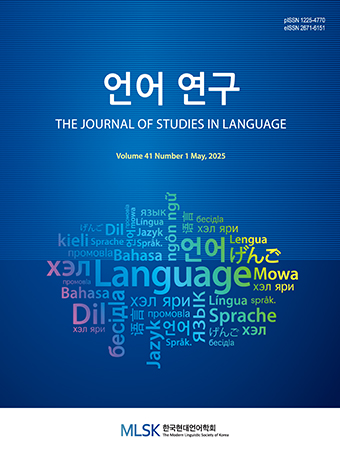Research Article
Abstract
References
Information
The purpose of this study is to examine the translation patterns of affirmative English sentences into negative Korean sentences. In this way, negative words are inserted when translated into Korean. This study was conducted by classifying and analyzing the addition of negatives to English-Korean translation into four types of English-Korean parallel corpus. First, when stative verbs are translated, negatives can be found inserted in the sentence to reveal the opposite of the will of the subject. Second, negative words are inserted when translating gradable adjectives in English into Korean to reveal the speaker's intentions through the effect of semantic dilution. Third, not only verbs or prepositions that already imply negation but adverbs with limited meaning in the source language are translated with negatives. Lastly, characteristics of result-oriented Korean language, the more specific explanation of semantic implication, and clarification of the main meaning lead to the insertion of the negatives in the process of translating.
- 공경희. 2004. 『파이이야기』. 경기: 작가정신.
- 김미형. 2002. 국어 완곡 표현의 유형과 언어 심리 연구. 『한말연구학회』 7, 27-63.
- 김세정. 2007. 부정 표현의 영한번역 연구. 세종대학교 대학원 박사학위논문.
- 김은일 .2010. 『부호화 체계와 번역』. 서울: 한국문화사.
- 김은일. 2018. 『문화 간 의사소통과 언어』. 서울: 한국학술정보(주).
- 김정우. 1997. 『영어 번역을 하려면 꼭 알아야 할 90가지 핵심 포인트』. 서울: 창문사.
- 김정우. 2002. 영어의 강조 표현과 그 번역기법. 『번역학 연구』 3.2, 27-46.
- 노대규. 2002. 『 한국어의 화용 의미론』. 서울: 국학자료원.
- 박종갑. 2001. 국어 부정문의 중의성에 대하여(2). 『한국어문학회』 1-20.
- 백봉자. 1975. 한국어의 부정과 그 범주. 『연세어문학』 6, 31-50.
- 송창선. 2010. 『국어통사론』. 서울: 한국문화사.
- 심지영. 2016. 한국어 결과 구문 연구. 서울대학교 박사학위논문.
- 오충연. 2010. 국어 결과 구문의 범주 설정에 대한 연구. 『언어연구』 26.3, 595-619.
- 왕은철. 2010. 『연을 쫓는 아이』. 서울: 현대문학.
- 이석규 외. 2002. 『우리말답게 번역하기』. 서울: 역락.
- 이종철. 2004. 『국어 표현의 화용론적 연구』 서울: 도서출판 역락.
- 이창덕. 2014. 현대 국어 부정 의미의 표현 형식과 화용 체계 연구. 『국어교육연구』 55, 265-288.
- 이현주. 2012. 한영 병렬자료에 나타난 한국어 긍정문의 영어 부정문으로의 번역. 부경대학교석사학위논문.
- 장경희. 1990. 국어 발화의 확대 해석. 『한글 학회』 209, 99-122.
- 정성열. 2008. 영한 번역에서의 자국화와 해석적 전략. 세종대학교 대학원 박사학위논문.
- 정해영. 2007. 『리버보이』. 서울: ㈜다산북스.
- 정희자. 1994. 시제와 상의 화용상 선택조건. 『애산학보』 15, 47-106.
- 정희자. 2002. 『담화와 추론』. 서울: 한국문화사.
- Bland, S. K. 1988. The present progressive: Grammar vs. Usage Revisited. TESOL Quarterly 22.1, 53-68. 10.2307/3587061
- Bowler, T. 2002. River Boy. NewYork: Simon Pulse.
- Clark, H. H. and T. B. Carlson. 1982. Speech Acts and Hears’ Beliefs. In N. V. smith (ed), Mutual Knowledge. London: Academic Press.
- Downing, A. and P. Locke. 2006. English Grammar. A university course. Routledge: New York. 10.4324/9780203087640
- Hosseini, K. 2003. The Kite Runner. NewYork: Penguin Group.
- Jespersen, O. 1964. Essentials of English Grammar. Tuscaloosa and London: The University of Alabama Press.
- Kim, K. Y. 2008. A Contrastive Analysis on Agency in English and Korean. The Linguistic Association of Korea Journal 16.1, 151-173.
- Leech, G. and J. Svartvik. 2002. A Communicative Grammar of English. London: Pearson Education.
- Levinson, S. C. 1987. Minimization and conversational inference. In Verschueren and Bertuccelli-Papi (eds.), Pragmatics. Cambridge: Cambridge University Press.
- Martel, Y. 2002. Life of Pi. NewYork: Harcourt.
- Nida, E. A. and C. R. Taber. 1974. The theory and Practice of Translation. Leiden: United Bible Societies.
- Quirk, R. 1985. A Comprehension Grammar of the English Language. New York: Longman Inc.
- Sperber, D. and D. Wilson. 1982. Mutual Knowledge and Relevance in the Theory of Comprehension, In N. V. Smith(ed), Mutual Knowledge. London: Academic Press.
- Tulving, E. and W. Donaldson. 1972. Organization of Memory. NewYork: Academic Press.
- Vinay, J. P. and J. L. Darbelnet. 2003. Stylistique comparée du français et de l’anglais (Korean Version: 『불어와 영어의 비교문체론』). (전성기 역). Seoul: Kupress (서울: 고려대학교출판부).
- Publisher :The Modern Linguistic Society of Korea
- Publisher(Ko) :한국현대언어학회
- Journal Title :The Journal of Studies in Language
- Journal Title(Ko) :언어연구
- Volume : 35
- No :4
- Pages :537-551
- DOI :https://doi.org/10.18627/jslg.35.4.202002.537




 The Journal of Studies in Language
The Journal of Studies in Language






